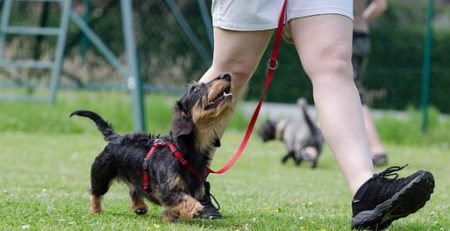The Top 10 Quietest Dogs
With more people working from home and more workplaces allowing you to bring your dog to work, you might be wondering about getting a canine companion. But no one wants a noisy dog barking in the middle of a meeting, or whining during an important interview. If you are planning to get a dog, you may want to opt for a breed that is known for being quiet. If you’re struggling to choose, fear not! The team at NewDoggy have put together a list of ten of the quietest dog breeds for your convenience.
Bernese Mountain Dog
This breed has a gorgeous tricolour coat, with a long thick double coat that is prone to shedding heavily as the seasons change. Slow to mature but very sweet tempered, the Bernese Mountain Dog is affectionate and gentle, calm and intelligent. Happiest in a cool climate, the Bernese loves the great outdoors, and will happily join you and your family for walks and playtime in the snow.
King Charles Cavalier
Playful but cuddly, the Cavalier loves comfort, but is equally delighted to be outdoors. The King Charles Cavalier needs a good walk every day, and ideally a fenced area such as a garden to run around and play in. This breed thrives on companionship, and shouldn’t be left alone for long periods of time.
French Bulldog
The French Bulldog is a born lapdog. This breed is smart and, so long as their lessons are fun, very trainable. They are very easy going dogs that love to be around people. Be aware that, like many brachycephalic breeds, the French Bulldog may have breathing problems, and is prone to overheating: keep your Frenchie cool on hot days to avoid heatstroke.
Borzoi
The Russian Sighthound was originally developed to hunt wolves. The modern Borzoi is more likely to be relaxing on the sofa than chasing down prey. Though remarkably calm dogs, Borzois can be a little stubborn and you’ll need to figure out how to motivate your Borzoi during training. Borzois are very clever and do well at all sorts of canine sports.
Greyhound
Greyhounds are typically very relaxed dogs, perhaps even lazy at times. These lovable dogs have no special exercise requirements, and are content with a walk twice a day (but try to keep them on a leash; if they start running you’ll never catch up!). Greyhounds also tend not to bark much, and adapt well to living in smaller homes.
Shih Tzu
Sometimes called the Chrysanthemum dog or Chinese Lion Dog, the Shih Tzu is small but solidly built. This “little lion” is covered in a long, silky double coat, from the tips of their long, floppy ears to the ends of their tails. They often have a long luxurious fringe covering their face, which is typically tied in a top knot to help them see. Alert and affectionate, the little Shih Tzu is clever, if a little stubborn, and not as yappy as the average small breed dog. Be sure not to over-indulge your Shih Tzu, or he/she will walk all over you!
Saluki
Today this noble sight hound is still used for hunting, but has also found a place in the agility world and as a beloved and devoted pet. Calm and dignified, Saluki has a strong instinct to hunt, and needs daily exercise to stay fit and happy. The Saluki is remarkably healthy, and makes an ideal companion for older children and adults.
English Bulldog
The English Bulldog is a loveable dog that is known to be great with kids. A medium sized dog, the Bulldog is sweet natured, loyal, and very sociable. Note that Bulldogs may sometimes be aggressive to unfamiliar dogs, due to their strong desire to protect their family. Bulldogs also don’t need much exercise – just a daily walk. The English Bulldog overheats very easily, so make sure to keep them cool in the summer.
Great Dane
The Great Dane is a typical gentle giant: their size belies their friendly nature. Although originally bred for hunting, modern Great Danes aren’t particularly active and are surprisingly comfortable in apartments, although they may accidentally knock things over due to their size.
Italian Greyhound
Nicknamed the “Iggy”, this miniature sighthound is a pint-sized hunting dog. Italian Sighthounds love to chase prey, so keep your dog on a leash when you’re outside. This small breed is ideal for apartment life. Beware: they can be difficult to toilet train! Italian Sighthounds are very affectionate, and make excellent family pets.
































